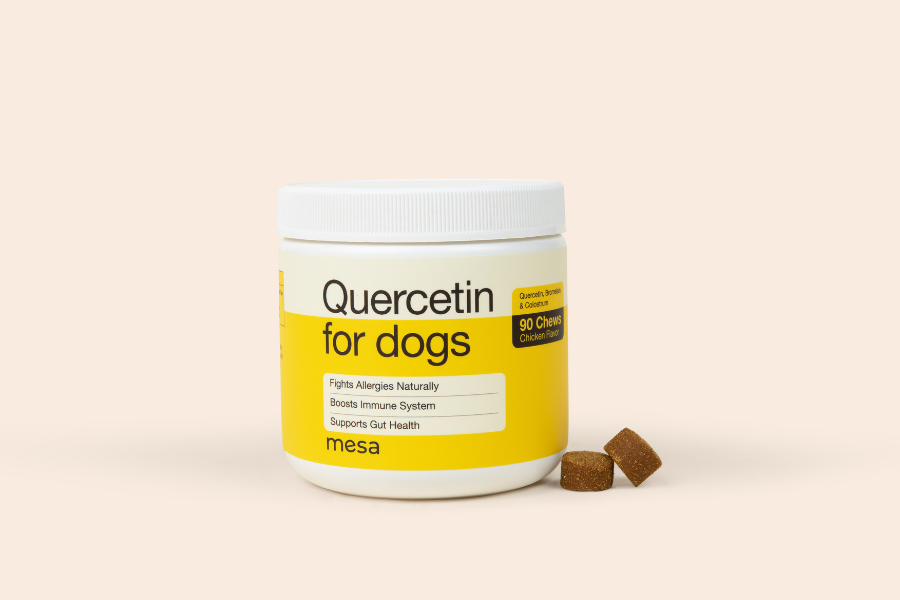Curious how quercetin can benefit your pup? Then this is the guide you need to read! We will be covering everything from quercetin's benefits and uses, to its potential risks, and how best to incorporate it into your dog's diet.
What is Quercetin?
Quercetin is found in a variety of fruits and veggies, including (but not limited to) berries, oranges, and broccoli. Quercetin is a flavonoid (which we will define in a sec) that actually gives many of these fruits and vegetables their bright, vibrant colors!
So, back to flavonoids... what the h-e-double hockey sticks is a flavonoid, anyway? Flavonoids, put simply, are compounds found in a bunch of fruits and veggies. Think of them like Mother Nature’s secret weapon for good health. They have antioxidant, anti-inflammatory, and even antiviral properties. Basically, they’re the unsung heroes working behind the scenes to keep you and your pup in top shape. So next time you munch on an apple or serve your dog some blueberries, know that flavonoids are doing their magic!
Quercetin itself is renowned for its antioxidant, anti-inflammatory, and antihistamine properties. But what does that mean for your dog? Let's dig deeper.
Why Consider Quercetin for Dogs?
In so many ways dogs and humans are alike. We experience a lot of the same emotions and share a lot of the same biology, including (fortunately or unfortunately), health issues. Chronic inflammation, immune issues, and allergies may be helped by the supplementation of quercetin - for both humans and pups. Here is the how and why:
Allergies Alleviated
If your dog suffers from allergies, quercetin might be a lifesaver. Its antihistamine properties can help reduce itching, sneezing, and other allergic reactions. This means fewer trips to the vet and a happier pup.
Anti-inflammatory Benefits
Inflammation is a thing for dogs too! And it is often what is behind conditions like like arthritis. Quercetin has anti-inflammatory properties that can help reduce pain and improve your pup's mobility (and quality of life).
Joint Health
Older dogs, in particular, can benefit from quercetin as it helps to maintain joint health. This means more playful days and fewer painful nights.
Digestive Health
Quercetin has also been shown to support digestive health by reducing inflammation in the gut, making it a multi-faceted supplement.
Boosting the Immune System
A strong immune system is vital for your dog’s overall health, and quercetin can play a role in boosting it. This means fewer illnesses and quicker recoveries.
Daily Defense
By adding quercetin to your dog’s routine, you’re helping to build up its defense against common illnesses.
Seasonal Support
During certain seasons, like winter, dogs are more prone to illnesses. Quercetin can provide that extra layer of protection they need.
Versatile Protection
Whether it's dealing with minor infections or protecting against more severe diseases, quercetin's immune-boosting properties shouldn't be overlooked.
Quercetin for Skin and Coat Health
Your dog’s skin and coat are indicators of its overall health. Quercetin can help maintain a shiny, healthy coat and soothe itchy, irritated skin.
Combatting Dermatitis
Quercetin’s anti-inflammatory and antihistamine properties can help combat dermatitis and other skin conditions.
Shiny Coat
Regular intake of quercetin can lead to a shinier, healthier coat. This means less shedding and more petting.
Itch Relief
If your dog is constantly scratching due to allergies or skin conditions, quercetin can provide much-needed relief.
What Are the Cons of Quercetin?
Alright, so quercetin sounds pretty awesome, right? But let's get real for a moment and talk about some of the downsides. No supplement is perfect, and quercetin is no exception.
Possible Side Effects
While generally safe, some dogs can experience mild side effects when first introduced to quercetin. We're talking upset stomachs, digestive issues, or even some rare instances of vomiting. Nobody likes seeing their furry friend uncomfortable, so it's crucial to keep an eye out for any changes in behavior or health.
Allergic Reactions
You may not have seen this coming, but quercetin, which can help allergic reactions, can sometimes cause an allergic reaction. If you notice an adverse reaction, which may include excessive scratching or an upset stomach, call your vet ASAP.
Interaction with Medications
Quercetin can interact with certain medications, including antibiotics and drugs metabolized by the liver. If your dog is on any medication, you'll want to double-check with your vet to ensure there won't be any adverse interactions. Safety first, always.
Quality and Purity
Not all quercetin supplements are created equal. Some might be of lower quality or contain additives and fillers that aren't great for your dog. You really need to do your homework and choose a reputable brand to avoid any nasty surprises.
Cost Considerations
This is a big one, as quercetin is not easy to make, therefore making it a relatively expensive supplement. Be sure to shop around, do not sacrifice quality, and keep in mind that sometimes paying more for a quality supplement is worth it to reap the benefits (versus a lower quality brand which may not be as effective).
Figuring Out How Much Quercetin is Right for Your Dog
Plopping the right amount of quercetin into your pup's food dish isn't exactly a piece of cake. It's kind of like ordering shoes online, not every size fits all. Your doggo's size, weight, age, and health state all come into play. When it comes to nailing that perfect dose, a chat with your vet is always your best bet.
A decent starting point is to shoot for 5 to 10 mg of quercetin for each pound your dog weighs, split into two helpings a day. But don't forget, every furry friend is unique, so some might need a bit more or less. When you're scratching your head, it's time to ring your vet.
Keep an eagle eye on your pooch after you start the quercetin. Any changes in behavior, eagerness for food, or how they're feeling physically can be a sign that you might need to tweak the dose. This way, you can be sure the supplement is doing its job or if it's time for a change.
How to Incorporate Quercetin into Your Dog’s Diet
Now that you know the benefits, the next step is incorporating quercetin into your dog’s diet. Here’s how you can do it effectively.
Supplements
There are various quercetin supplements available specifically formulated for dogs. These are usually the easiest and most effective way to ensure your dog gets the right dosage.
Natural Sources
You can also add quercetin-rich foods to your dog’s diet. Foods like apples (without seeds), berries, and broccoli are great options.
Where to Buy Quercetin for Dogs
Finding the right source of quercetin is crucial. Here are some trusted places to buy quercetin supplements for your dog.
Online Retailers
Websites like ours, or even Amazon offer a variety of quercetin supplements for dogs. Always check reviews and product details to ensure quality.
Pet Stores
Many pet stores carry quercetin supplements. Staff at these stores can often provide useful recommendations.
Veterinary Clinics
Your vet may also have quercetin supplements available or can recommend trusted brands.
Comparing Quercetin to Other Supplements
Quercetin isn’t the only supplement out there. Here’s how it stacks up against other popular supplements for dogs.
Quercetin vs. Fish Oil
Fish oil is known for its anti-inflammatory properties. While both are beneficial, quercetin also offers antihistamine benefits, making it more versatile.
Quercetin vs. Glucosamine
Glucosamine is commonly used for joint health. Quercetin, while also good for joints, provides additional benefits like allergy relief and immune support.
Quercetin vs. Probiotics
Probiotics are great for gut health. Quercetin complements probiotics by reducing inflammation and supporting overall health.
FAQs About Quercetin for Dogs
You got questions, we got answers, dog. Here are some frequently asked questions about quercetin for dogs to clear up any doubts.
How Does Quercetin Work for Dogs?
So, what the heck is quercetin and how does it work for dogs, anyway? In a nutshell, quercetin is a substance (a flavonoid) found in fruits that can act as an ant-histamine - for humans and for dogs! It may also have anti-inflammatory and immunomodulating effects, which could help dogs with joint pain and other inflammatory issues.
Can I Give Human Quercetin Supplements to My Dog?
It’s best to stick to supplements formulated for dogs to ensure the correct dosage and ingredients.
How Much Time Does Quercetin Take to Work for Allergies?
So just how long does it take for you, and your pup to see any noticeable effects from quercetin? Like all good things, quercetin takes time to work its magic. In most cases it will take a few weeks (maybe sooner) to notice any positive effects.
Conclusion
Quercetin can be a game-changer for your dog’s health. From alleviating allergies to boosting the immune system, its benefits are vast and varied. By incorporating quercetin into your dog’s diet, you can help them live a happier, healthier life.
References
1) Salehi B, Machin L, Monzote L, Sharifi-Rad J, Ezzat SM, Salem MA, Merghany RM, El Mahdy NM, Kılıç CS, Sytar O, Sharifi-Rad M, Sharopov F, Martins N, Martorell M, Cho WC. Therapeutic Potential of Quercetin: New Insights and Perspectives for Human Health. ACS Omega. 2020 May 14;5(20):11849-11872. doi: 10.1021/acsomega.0c01818. PMID: 32478277; PMCID: PMC7254783.



